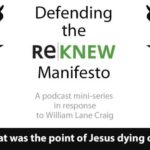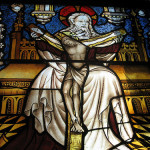We run our website the way we wished the whole internet worked: we provide high quality original content with no ads. We are funded solely by your direct support. Please consider supporting this project.

How Much Does the Cross Really Matter?
The cross is as foolishness and weakness to nonbelievers, but Paul wrote that to those who are being saved it is both “the power” and “wisdom of God” (1 Cor 1:18, 24). In sharp contrast to the controlling power and wisdom that has been ascribed to God or the gods throughout history—including in much of the OT and, unfortunately, throughout most of church history—Paul allowed the humble love expressed on the cross to completely reframe his understanding of God’s power and wisdom. It is apparent that for Paul, the cross is not merely “God’s means of achieving salvation” but also “a paradigm for God’s action in the world,” as Graham Tomlin notes. “God gets things done not by a conventional human use of power, by displays of force,” but by the kind of self-giving love expressed on Calvary.
N.T. Wright captures the supreme importance of the cross for Paul’s theology, and therefore the central place it ought to have for our theology, when he states that, if we allow it to, Paul’s confession that the crucified Christ is Lord “will strain all our categories [for thinking and speaking about God] to the breaking point and beyond.” For in light of this central revelation, “the meaning of the word ‘God’ includes not only Jesus, but, specifically, the crucified Jesus.” Indeed, when God’s omnipotence and wisdom are most unambiguously put on display, according to Paul, they look like the “weakness” and “foolishness” of the cross (1 Cor 1:18, 22-5). And, to stretch conventional ways of conceiving of God “to the breaking point and beyond,” this entails that any conception of divine power and wisdom that is contrary to the “weakness” and “foolishness” of the cross—viz. any conception that characterizes God’s power in terms of control rather than self-sacrificial love—must be identified as essentially pagan.
Reflecting this same cross-centered focus, Paul instructs disciples to imitate (mimetai) God, which he not surprisingly defines as walking “in the way of love, just as Christ loved us and gave himself up for us” (Eph 5:1-2, emphasis added). To imitate God, clearly, is to live in a way that reflects the self-sacrificial love displayed on Calvary. According to Paul, the command to reflect this kind of love is to be placed “above” every other command (Col 3:13). Hence, everything we do is to reflect God’s cruciform, agape love (1 Cor 16:14).
What is more, in strict accordance with the teachings of Jesus (Lk 6:26-35), Paul taught that this kind of love was to be extended even to enemies. Paul instructed disciples to “[b]less those who persecute you” (Rom 12:14) and to never “repay anyone evil for evil” (12:17). In this way they will “not be overcome by evil,” but will instead “overcome evil with good” (Rom 12:21). So too, Paul says followers of Jesus are to never “take revenge.” Instead, he writes: “If your enemy is hungry, feed him; if he is thirsty, give him something to drink” (Rom 12:19-20). It is evident from Paul as well as from Jesus that the defining call of a disciple is to manifest the loving, cruciform character of God revealed on the cross to all people at all times, both within the church and without, including life-threatening enemies.
As is true throughout the NT, Paul assumes that embracing a cross-centered lifestyle implies that disciples must be willing to endure persecution, and perhaps even martyrdom, for the sake of Christ. Indeed, for Paul, disciples are not only to suffer for Christ (Phil 1:29); we are called to suffer with Christ (2 Cor 1:5; Phil 3:10; Col 1:24). This, in fact, is a precondition for sharing in Christ’s eschatological glory (Rom 8:17).
Paul is well aware that disciples cannot live this cruciform life and share in Christ’s suffering by their own power. It is only by means of the Spirit of the crucified and risen Lord working in us that this is possible (Gal 2:19-20; Phil 3:10; 1 Tim 1:8). Indeed, Paul declares that the same “incomparably great power” that raised “Christ from the dead and seated him at [God’s] right hand in heavenly realms” is now available “for us who believe” (Eph 1:19-20).
Image by Christopher JL via Flickr.
Category: General
Tags: Crucifixion, God, God's Character, Jesus, Persecution, Power, Suffering
Topics: Attributes and Character
Related Reading

Podcast: Defending the Manifesto (7 of 10)
Greg responds to challenges by William Lane Craig from Craig’s podcast “Reasonable Faith.“ Greg discusses atonement and the shortcomings of penal substitution theology. http://traffic.libsyn.com/askgregboyd/Episode_0062.mp3

Is God Immutable? Part II
Yesterday, we looked at the common understanding of divine immutability and the problems inherent to it. Click here to read that post. Today, let’s look at what the immutability of God actually means. Instead of accepting Plato’s misconceived ideas about perfection, followers of Jesus should keep our eyes focused on Jesus and thus view all…

Oh Constantine
Once upon a time there was a Roman Emperor named Constantine who used the enemy-loving Jesus to kill his enemies. What does this have to do with us? Find out:

Was Jesus Abandoned by the Father on the Cross?
As Jesus hung on the cross, he cried, “Eli, Eli, lema sabachthani?” (Mt 27:46). This is the cry of our God who stooped to the furthest possible depths to experience his own antithesis, as the all-holy God becomes the sin of the world (2 Cor 5:21) and the perfectly united God becomes the curse of…

Atonement: What is the Christus Victor View?
Most western Christians today understand the atonement as a sort of legal-transaction that took place between the Father and the Son that got humanity “off the hook.” The legal-transaction scenario goes something like this: God’s holiness demands that all sin be punished, which in turn requires that sinners go to eternal hell. The trouble is,…

Why Did Jesus Curse The Poor Fig Tree?
Why Did Jesus Curse The Fig Tree? One of the strangest episodes recorded in the Gospels is Jesus cursing a fig tree because he was hungry and it didn’t have any figs (Mk 11:12-14; Mt 21:18-19). It’s the only destructive miracle found in the New Testament. What’s particularly puzzling is that Mark tells us the…
